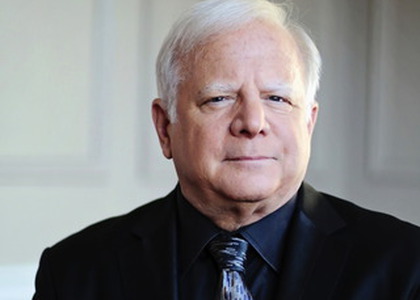> Interviews

Interview with conductor Leonard Slatkin
Leonard Slatkin, one of the most iconic conductors of U.S.A will lead this week's concerts of the "George Enescu" Philharmonic. Multiple Grammy winner, devoted promoter of musical composers of the 20th century, Slatkin was, throughout the decades, musical director of the National Symphony Orchestra, Washington D.C., main conductor of the BBC Symphony Orchestra and musical director of Detroit Symphony Orchestra.
Today and tommorror, the 21st and 22nd of March, the artist conducts a program with works by Stefan Zorzor, Pyotr Ilyich Tchaikovsky and Hector Berlioz. Leonard Slatkin in a discussion with our colleague, Ștefan Costache:
Maestro Leonard Slatkin, I believe I am not mistaken by saying that this is your first appearance on the Romanian Athenaeum's stage. Welcome! The two concerts you are conducting promise to be true events of the Romanian music scene, of the current season. What are your initial impressions after the first rehearsals you have conducted and what do you think about the George Enescu Philharmonic Symphony Orchestra?
I am delighted to be here. I believe this is my second visit to Romania. Previously, I was on a tour that included Bucharest, but usually on these tours, you just arrive, go to the hotel, perform your concert, and leave the next day. So, I don't really have memories of my debut here. However, this time I can spend a week in Bucharest, which means I will have a better perception of the people and, in this case, of course, about the Athenaeumhall and the orchestra that resides here. At the time of our discussion, two rehearsals have already taken place, and I must say that the hall where we will perform is splendid in resonance. The sound simply sings, and there is an excellent response to what the lower instrument section of the orchestra does, and these aspects, as far as I'm concerned, are extremely important. How it truly sounds, of course, we won't know until the concerts take place because the presence of the audience changes everything. I have to tell you that I am very impressed with the orchestra. We have dedicated most of the rehearsals to Hector Berlioz's Symphonie fantastique, which they, of course, have played not just once. I myself have conducted it countless times, have my own ideas about the symphony, and the orchestra members accept them. And we all start to create a very interesting kind of sound. For me, Berlioz is the most revolutionary of all composers. Beethoven, for example, had been dead for only 3 years when the Symphonie fantastique was composed. But the sonorous world is already so different. From Berlioz's writing it's not easy to understand what he actually thought. Working with the Philharmonic Orchestra is truly wonderful. I can't say I'm surprised, I expected it, considering what other artists who have been here before had told me. But beyond that, you never know if the chemistry between the conductor and the orchestra will really exist. In this case, I believe the answer is positive. I feel great, and I hope the musicians feel the same way.
The chosen program is particularly spectacular and, at the same time, unique: it opens with a piece by the Romanian composer, Ștefan Zorzor. How does it actually sound, how is this work of his, called "To Bartók with love"?
When I was asked to conduct this program, I was asked if I was going to include a Romanian work, and I didn't want to do Enescu - not that I don't appreciate his work, I really do, but I wanted something different. And it happened that my tour manager, my agent, happened to be Zorzor's daughter. An author I knew absolutely nothing about before. His daughter gave me this score to get an opinion and I replied that it might be interesting. I could conduct it, as it's something a little different. It's unusual music from a composer who I believe is 92 or 93 years old. He lives in Munich, won't be in the audience at the two concerts, but his wife will be here. It's titled "To Bartók with Love," I'm not sure at all for what reason; because you don't hear anything of Bartok's music in it, but there are two or three elements that connect with the Hungarian author. A somewhat unusual creation, it starts as if it were minimalist, to move into an almost impressionistic sound world. Researching Stefan Zorzor, I noted that he was extremely active in the field of film music, but also in concert hall music, so I'm conducting the work because it's a nice idea to have it in the program, since I couldn't include a work by an American composer, it will be a Romanian one, which is not bad at all, from my point of view.
Translated by Georgiana Morozii,
University of Bucharest, Faculty of Foreign Languages and Literatures, MTTLC, year II
Corrected by Silvia Petrescu














